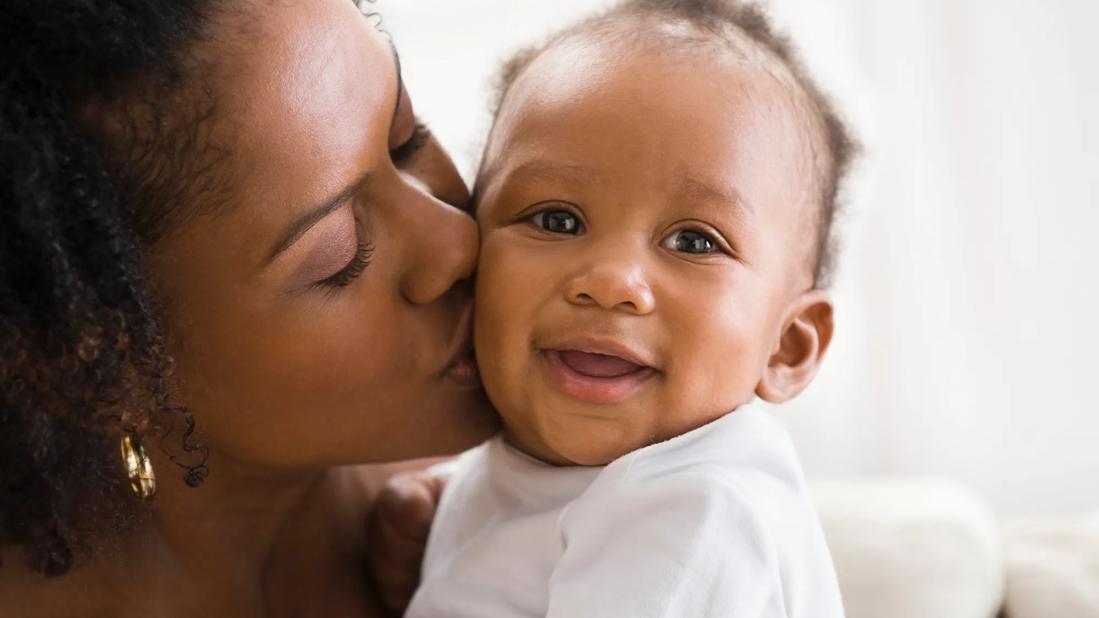‘Social smiles’ typically start around 8 weeks old, while laughter comes later — around 4 to 6 months

Image content: This image is available to view online.
View image online (https://assets.clevelandclinic.org/transform/16725244-a518-4170-8440-70cffa4f6f2e/baby-smiling-132264446)
Caregiver kissing smiling baby
There’s nothing like a baby’s toothless grin to light up your day — and a big belly laugh makes it even better. But at the beginning of your child’s life, these facial expressions and sounds are fleeting, if they happen at all.
Advertisement
Cleveland Clinic is a non-profit academic medical center. Advertising on our site helps support our mission. We do not endorse non-Cleveland Clinic products or services. Policy
When do babies smile and laugh for real? Pediatrician Jacqueline Kaari, DO, weighs in.
We hate to break it to you, but your baby’s first smiles aren’t really smiles at all, or at least not in the sense that you’re hoping for. Within the first few weeks of their lives, smiles are a newborn reflex — something their body does involuntarily.
That fleeting smile after a bottle? It was probably accompanied by a satisfying fart. And that sleepy grin they flashed while fast asleep in their crib? That was likely a product of REM sleep.
“When babies are young, it will seem like they’re smiling, but they’re really not,” Dr. Kaari clarifies. “Their bodies are still just learning how to do everything. It’s not until later that you’ll get actual, genuine smiles.”
But these reflexes are important. They help strengthen your baby’s facial muscles so they can eventually bust out the real thing.
By eight weeks (about two months), your baby may start to show social smiles. These are the real, intentional and responsive smiles when something catches their attention.
“You’ll start to notice that they’re paying attention to voices and trying to respond, especially related to feeding cues,” Dr. Kaari says. “Soon, as you talk to them, you’ll see that they begin to smile back at you.”
Advertisement
All babies develop on different timelines, so if you’re still not seeing social smiles by the two-month mark, don’t panic. Give your baby some time to hit this milestone.
After smiling comes laughing, usually around four to six months.
“They’ll start to make purposeful noises, including those little chuckles,” Dr. Kaari says. “This is around the time when they start to make lots of cooing sounds, too, where you talk to them and they make noise to ‘talk’ back.”
But as with smiling (and all milestones), laughter doesn’t always arrive on cue. Your baby may start laughing sooner or later than this estimated timeframe.
As a parent, it’s all too easy to get wrapped up in concerns about whether your baby is developing at a normal pace — and that includes wondering whether they’re late to smile or laugh.
First, try to remember that in addition to developing at their own pace, each baby has a different personality. After all, they’re just tiny people!
“Some babies are very easy to smile,” Dr. Kaari acknowledges, “and then there are other babies where you have to work really hard to get them to smile back at you. All of that is normal.”
But how and when can you tell if a developmental issue could be at play? If your baby isn’t yet smiling or laughing (or if they do it infrequently enough to concern you), pay attention to their other behavior as well. Talk to your child’s pediatrician if your baby is:
“If you notice a difference, seek support right away,” Dr. Kaari urges. “There are varieties of therapies for children, like early intervention, that can give babies that little extra support they need.”
Advertisement

Sign up for our Health Essentials emails for expert guidance on nutrition, fitness, sleep, skin care and more.
Learn more about our editorial process.
Advertisement
Most babies will crawl between 7 and 10 months old, but later can be normal, too
Adding extra formula, cereal or medications to your baby’s bottle is a dangerous and misguided practice
Teaching your baby to sign may help ease frustrations before they can talk, but it’s not a must-do
Babies can get congested easily, but you can calm their cough by keeping them hydrated, using nasal drops and running a humidifier
Try to burp your baby mid-feed and after they finish eating — but don’t sweat it if they don’t burp
Most babies will recognize their name by about 9 months old
Clean your baby’s mouth with a washcloth or small toothbrush if they have a tooth or you suspect thrush
Most infants can roll from tummy to back by 6 months old — but remember, every child develops at their own pace
Although it could be used as a moisturizer, this new trend is not recommended
Communicating clear limits helps protect your time, energy and emotional well-being
High cholesterol can be genetic, but testing and treatment can lower your heart disease risk